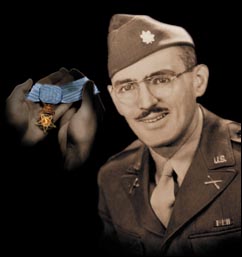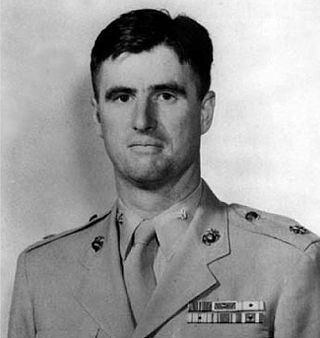
The Battle of Chosin Reservoir, also known as the Chosin Reservoir Campaign or the Battle of Lake Changjin, was an important battle in the Korean War. The name "Chosin" is derived from the Japanese pronunciation "Chōshin", instead of the Korean pronunciation.
Chosen or The Chosen may refer to:

Oliver Prince Smith was a U.S. Marine four-star general and decorated combat veteran of World War II and the Korean War. He is most noted for commanding the 1st Marine Division during the first year of the Korean War, and notably during the Battle of Chosin Reservoir, where he said "Retreat Hell! We're just attacking in another direction.", which is commonly misquoted as "Retreat, hell! We're not retreating, we're just advancing in a different direction." He retired at the rank of four-star general, being advanced in rank for having been specially commended for heroism in combat.

USS Chosin (CG-65) is a Ticonderoga-class guided-missile cruiser serving in the United States Navy. She is named in honor of the Battle of Chosin Reservoir of the Korean War. Commissioned in 1991, she is currently serving in the Pacific Fleet, based at Naval Base San Diego. The cruiser has participated in Operation Southern Watch, Operation Enduring Freedom, and Operation Iraqi Freedom. She is the first US Navy ship to bear this name.

John Upshur Dennis Page was a United States Army officer from Saint Paul, Minnesota. Lieutenant Colonel Page received the Medal of Honor for his actions in the Battle of Chosin Reservoir during the Korean War.

The Regimental Combat Team 31 (RCT-31), commonly referred to as Task Force Faith of the "Chosin Few", is a United States Army unit known for its role in the Battle of Chosin Reservoir during the Korean War where 90-95% of its force was killed, wounded, and/or captured on the eastern side of the reservoir.

William Earl Barber was a United States Marine Corps colonel. He fought on Iwo Jima during World War II and was awarded the Medal of Honor for his actions in the Battle of Chosin Reservoir during the Korean War.

The 7th Marine Regiment is an infantry regiment of the United States Marine Corps based at Marine Corps Air Ground Combat Center Twentynine Palms, California. Nicknamed the "Magnificent Seventh", the regiment falls under the command of the 1st Marine Division and the I Marine Expeditionary Force.

Sergeant James Edmund Johnson was a posthumous recipient of the United States' highest decoration — the Medal of Honor — for his heroic lone fight on December 2, 1950, to cover the withdrawal of his platoon during the bitter Chosin Reservoir campaign in Korea. When last seen by his comrades Johnson was wounded, but still engaging the enemy in close grenade and hand-to-hand combat. The enemy were wearing the uniforms of friendly troops at the time. He was listed as missing in action until December 2, 1953, when his status was officially changed to killed in action.

Robert Sidney Kennemore, of Greenville, South Carolina, earned the Medal of Honor during the bitter Chosin Reservoir campaign of November 1950, when he deliberately covered an enemy grenade with his foot to keep his men from being wounded or killed. Staff Sergeant Kennemore, who lost both of his legs through his unselfish sacrifice, was the 23rd Marine to receive his nation's highest award for heroism in Korea. The medal was presented to him by President Harry S. Truman during ceremonies at the White House on November 24, 1952.
Lake Changjin (Korean: 장진호), known widely in the West as Chosin Reservoir, is a lake located in Changjin County, North Korea. It is most famously known for being the site of the Battle of the Chosin Reservoir, which was an important battle in the Korean War.

Changjin County is a mountainous county in South Hamgyong Province, North Korea.

The I Corps is a corps of the Republic of Korea Army. It is named 'GWANGGAETO'.
The 89th Division(Chinese: 第89师)(2nd formation) was a military formation of the People's Liberation Army.

William Frederick Harris was a United States Marine Corps (USMC) lieutenant colonel during the Korean War. The son of USMC General Field Harris, he was a prisoner of war during World War II and a recipient of the Navy Cross for extraordinary heroism during the breakout in the Battle of Chosin Reservoir. He was last seen by American forces on December 7, 1950, was listed missing in action and is presumed to have been killed in action. Harris was featured in the book and film Unbroken.

This Is Korea is a 1951 American documentary film about the Korean War. It was directed by John Ford with a screenplay by James Warner Bellah.
The Second Phase Offensive or Second Phase Campaign of the Korean War was an offensive by the Chinese People's Volunteer Army (PVA) against United Nations Command (U.S./UN) forces, most of which were soldiers of South Korea and the United States. The two major engagements of the campaign were the Battle of the Ch'ongch'on River in the western part of North Korea and the Battle of Chosin Reservoir in the eastern part of North Korea.
Webb Duane Sawyer was a highly decorated United States Marine with the rank of brigadier general. He was awarded the Navy Cross and three Silver Stars during one deployment in Korea.
Harold Sigward Roise was a highly decorated United States Marine Corps colonel. He was the recipient of two Navy Crosses during the Korean War, the United States military's second-highest decoration awarded for valor in combat.
Allan Sutter was a highly decorated United States Marine Corps colonel. He was awarded the Navy Cross at the battle of Chosin Reservoir during the Korean War.













